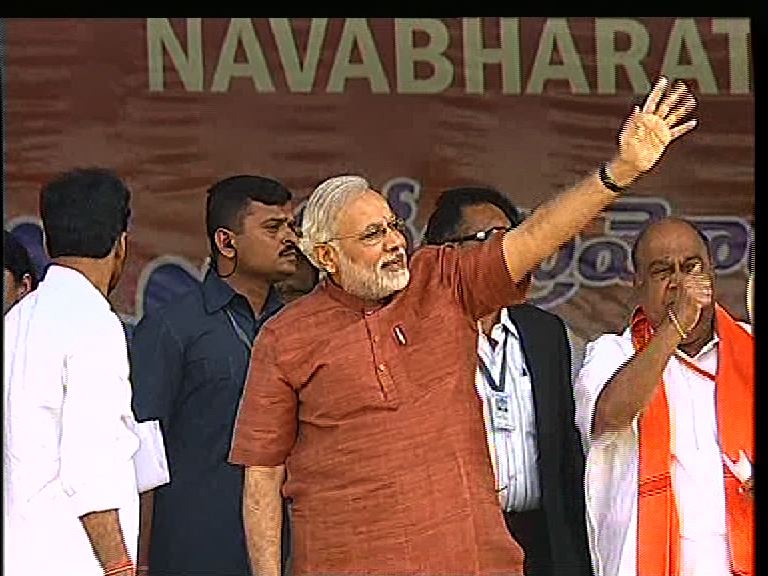Affairs of men often proceed like a Mexican wave and all human beings are imitating animals in some respects. So, there is hardly any reason to find fault with Gujarat chief minister Narendra Modi for his full-throated invocation of "we can", borrowed from US president Barrack Obama, at his rally in Hyderabad on Sunday.
Read more: Freedom from Cong rule: what Modi said in Hyderabad
In the US presidential election, Obama coined this slogan to generate optimism in his country that was passing through a phase of despondency, despair and depression on account of the war and economic downturn. Thanks to his ingenuity Modi has added another slogan, "we will do". Perhaps Modi's move to imitate Obama must have been inspired by a similar situation in India where pessimism seems to be all pervasive.
But there are questions that beg answer: "Can he?” and “what will he do?" Modi's Hyderabad rally is seen as a precursor to his campaign for his prime ministerial ambitions. He was supposed to unveil his political programme and roadmap consistent with people's aspirations and hopes generated by him. But Modi's speech fell far short of those expectations and remained confined to the usual rhetoric.
For instance, his rather belligerent posturing on Pakistan and the killing of army jawans in the recent past was clearly apt and intended to address his core constituency. But his attempt to draw a parallel between recent communal events in Kishtwar and the situation in the Kashmir valley (an obvious reference to attacks on Hindus) for the past two decade was clearly aimed at deepening communal polarisation. The Chinese aggression on the other hand, found only a passing mention given China's extraordinary good business relations with his state.
His proclivity to refer to Sonia Gandhi's country of birth, Italy, came to the fore when he raked up the issue of the bail granted to the Italian marines who killed fishermen from Kerala. His insinuation was that the central government showed laxity in letting the marines go but he appreciated the supreme court’s tough line that forced Italy to send back the marines for further trial. Once again the objective of this reference was to sow seeds of doubt about Sonia's “double loyalties” – to her nation of birth apart from India – through innuendos.
Right from the beginning, he was acutely aware of the landmines in the way in talking about the Telangana/ Seemandhra issue. So he resorted to his skills as demagogue to skirt the landmines and made an emotional appeal to both sides. He accused the Congress of playing divide-and-rule and cautioned people against its machinations. To take this emotional appeal to a crescendo, he resorted to slogans like "Jai Andhra and Jai Telangana".
In the ongoing debate on growth between two leading economists of international repute, Amartya Sen and Jagdish Bhagwati, Modi made clear his preference for the latter and even ridiculed the other’s notion of "inclusive growth" – a slogan of the UPA government. In his view, the growth will invariably be inclusive unless interrupted by the Congress and its corrupt practices. He explained that in his vision, the government has to work on the "India first" theme to keep the national interest supreme. That Modi signed off on resonating chants of "Vande Mataram" along with slogans in English "We can, we will do" was characteristic of a heady cocktail of patriotism tempered by optimism of a dream.
In sum, Modi's speech was certainly long on rhetoric and short on content. But Obama also faced similar criticism in beginning of his campaign. As he picks up his campaign, Modi will have ample opportunity to evolve his campaign in a coherent political formulation. But what Modi appears to be lacking is the universal charm and credibility of Obama. In a country of predominantly whites and Christians, Obama was black and born to a Muslim father. He never shied away from his legacy and emerged as symbol of conciliation, change and peace for a society beset by wars and burdened by the history of racism. Obama measured himself up to the challenge. Can Modi do it?

